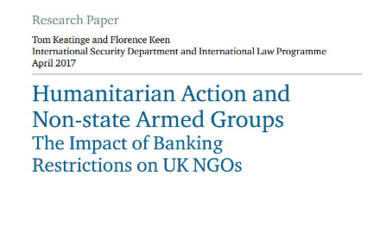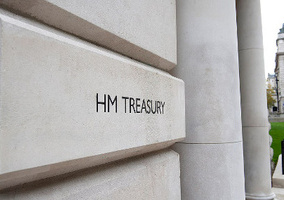The UK government, banks and non-governmental organisations all need to work together to tackle problems with bank de-risking that are disrupting the work of NGOs.
A research paper has been produced by policy insitute Chatham House which looks at the issues faced by NGOs as a result of bank de-risking, and what can be done to address issues faced by NGOs as a result.
The paper Humanitarian Action and Non-state Armed Groups: The Impact of Banking Restrictions on UK NGOs, which was produced last month, says that many UK-registered NGOs are faced with “unreported financial restrictions and an increasing bureaucratic burden placed on them by banks”.
The research paper states that although humanitarian NGOs generally accept the need for regulation and due diligence, the “current weight of compliance demands by their banking partners is often seen as disproportionate”.
It states that this has resulted in a need “to spend donor money on additional staff and due diligence tools, increased administration costs, aid delivery and financial transfer delays, and in some circumstances the closure of programmes to which funding cannot be delivered”.
It also says that banks and NGOs must cultivate relationships – with the support of the Charity Commission – that allow for reciprocal education regarding compliance expectations on the part of the former, and the operating risks and mitigation steps being taken by the latter.
Commission should form working group
The research paper also said that the Charity Commission should form a banking working group that “facilitates learning and assists banks to develop due diligence procedures that are relevant for the NGO sector”.
It also said that banks need to “develop specialist knowledge to better equip them to understand the NGO sector”, rather than treat them as though they are a subset of their corporate client base.
It outlined some lessons for NGOs too. It said that they need to engage (if they are not already doing so) with their banks to demonstrate the extent to which they have raised their operating standards in recognition of the risk environment in which they operate.
It also called on NGOs to build relationships and educate banks on the nature of their humanitarian programmes.
However, the report says that it is the UK government who must “take leadership and ownership of the challenges” that the report has identified. It says it needs to “provide clear guidance, support and consistent messaging on the use of licenses”, and consider the introduction of humanitarian exemptions from counterterrorism laws that provide legal certainty for NGOs and their bankers, thereby “removing the ambiguity, complexity and inefficiency of licensing”.
It says that the government should also take the lead in engaging with other key regulatory jurisdictions, particularly the US, to ensure that the current exterritorial regulatory threat is addressed.
It says: “Without this leadership, the UK government’s development objectives are at risk of failure, as loss of financial services further restricts the activity of NGOs at a time when their activities are certainly more critical than ever before.”
|
Related articles











